Ata-ul-Haye Nasir and Tahmeed Ahmad, Ahmadiyya Archive & Research Centre
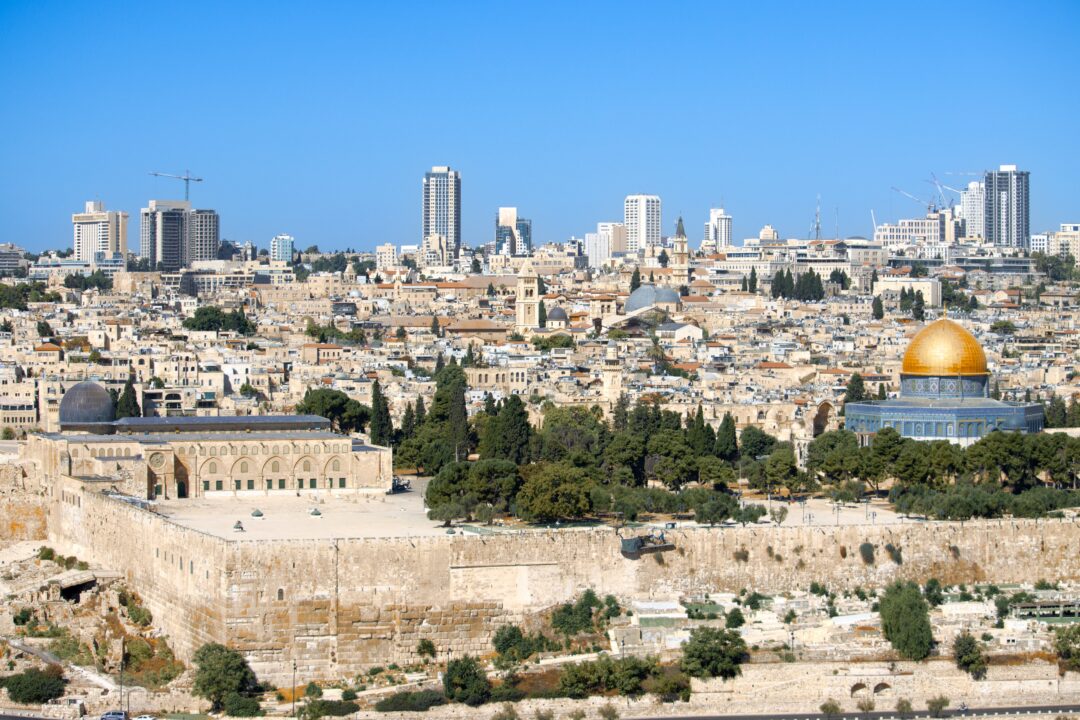
Following in the footsteps of the Promised Messiahas, the Khulafa of Ahmadiyyat have always urged Muslims to unite for the defence of Muslim countries, people, and Islam as a whole. The same was the case on the issue of Palestine, as the history of Ahmadiyyat testifies to the fact that Khulafa-e-Ahmadiyyat have continuously raised their voice for the rights of the oppressed Muslims of Palestine. In accordance with the guidance from Khalifa of the time, the Ahmadi missionaries serving all over the world have raised their voice for Palestinian Muslims and the rights of oppressed nations everywhere.
Readers can find various articles in Al Hakam that shed light on Jamaat-e-Ahmadiyya’s services for the Muslim world in general and Palestinian Muslims in particular. This article will only focus on the Ahmadiyya Jamaat’s support for the Arab world amidst the delicate situation in Palestine in 1938-39.
Before delving into this, it is important to mention what led to such turbulent circumstances. So, let us go back to 1917.
Balfour Declaration
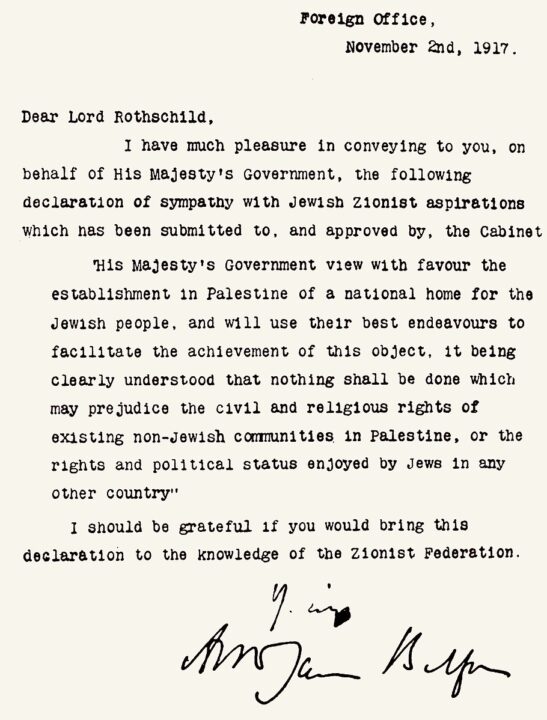
In November 1917, a public statement was issued by the British Government during World War I, known as the Balfour Declaration. In this statement, they announced their support for “the establishment in Palestine of a national home for the Jewish people.” This statement was contained in a letter – dated 2 November 1917 – from the then British Foreign Secretary Arthur James Balfour to a leader of the Anglo-Jewish community, Lionel Walter Rothschild. This statement was published in the press on 9 November 1917.
This pledge is generally viewed as one of the main catalysts of the Nakba, the mass displacement and dispossession of Palestinians during the 1948 Arab-Israeli war. The statement “was included in the terms of the British Mandate for Palestine after the dissolution of the Ottoman Empire.” Upon the outset of “the mandate, the British began to facilitate the immigration of European Jews to Palestine. Between 1922 and 1935, the Jewish population rose from nine per cent to nearly 27 per cent of the total population.” In essence, “the Balfour Declaration promised Jews a land where the natives made up more than 90 per cent of the population.” (“More than a century on: The Balfour Declaration explained”, www.aljazeera.com, 2 November 2018)
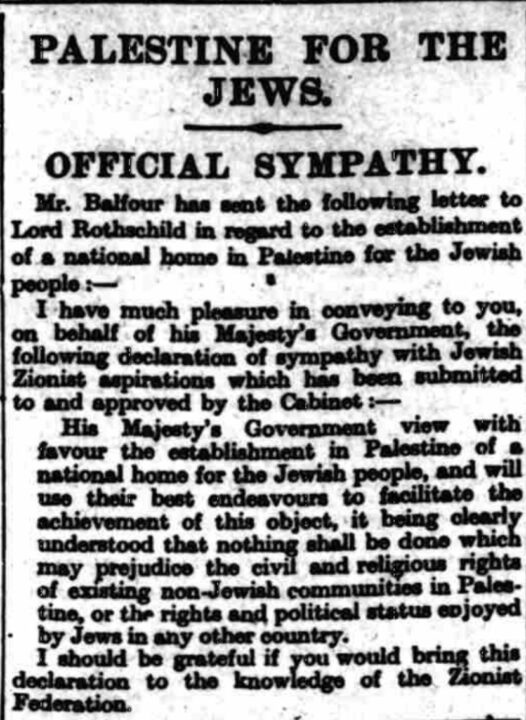
Issues faced by the local Arabs
By the end of the first decade of the British Mandate, 120,000 Jews had migrated to Palestine; by the end of the second, another 300,000. The price of land had soared to the point where it was no longer possible for the local common Arabs to maintain even smaller pieces of land, let alone purchase them anymore. The Jewish settlers, arriving and thriving under British patronage, set out on a spree of purchasing land. In a very short amount of time, Tel Aviv and its surrounding areas were flying high in their newfound technological and agricultural boom. It was quite natural for the local Arab Muslims to see this as a foreign encroachment into their lands. (“Borders of the Holy Land: A brief study in theology and geopolitics”, www.alhakam.org)
Palestine’s volatile condition in 1939
During the latter part of the 1930s, on the one hand, Europe was on the brink of a disastrous war, and on the other, Palestine was going through a very volatile situation.
Narrating about the situation in Palestine, Michael J Cohen from the Bar-Ilan University of Israel stated:
“The [British] Foreign Office and the Chiefs of Staff had since 1937 been stressing the need to settle the Palestine question in a manner ‘satisfactory’ to the Arab States. The year 1938 proved to be one of crisis, both in Europe and in Palestine. Events reached their climax almost simultaneously in both areas. At the same time as Britain was taking emergency measures in view of the Munich crisis, the government awaited with trepidation the Report of the Woodhead Commission, sent to Palestine the previous March, in order to work out the technical details for a partition of Palestine. […] From the beginning of 1938, British strategical thinking on the Eastern Mediterranean had two main aims. The first was the provision of a Middle Eastern Reserve force, which, while acting as a police force in Palestine if necessary, would have as its main task the defence of the Suez Canal. Second, apart from the priority given to the settlement of the Palestine problem politically, the Middle Eastern (Official) Sub-Committee of the Committee of Imperial Defence was charged in March 1938 with devising measures to influence the Minor Powers and Arab States in the Near East. […] In January 1939, the Middle Eastern Sub-Committee submitted its final, detailed report back to its parent body. The report was prefaced by another reminder of the effect which British policy in Palestine was having in the Arab countries:
“‘We feel it is necessary to point out at the outset, as an essential part of our report, the strong feeling which exists in all Arab States in connection with British policy in Palestine. It is evident that by far the most important measure which could be taken to influence the Arab States in favour of the United Kingdom would be our Palestine policy. We assume that, immediately on the outbreak of war, the necessary measures would at once be taken… in order to bring about a complete appeasement of Arab opinion in Palestine and in neighbouring countries… if we fail thus to retain Arab goodwill at the outset of a war, no other measures which we can recommend will serve to influence the Arab States in favour of this country…’” (Cohen, Michael J. “Appeasement in the Middle East: The British White Paper on Palestine, May 1939”, The Historical Journal, 16, no. 3 (1973): 571–96, www.jstor.org/stable/2638205)
Plan for a conference in London on the Palestine issue
In light of the above-mentioned situation in Palestine, the British government organised a conference of the Arab countries in relation to the issue of Palestine in February and March 1939. The aim was to discuss the situation in Palestine and find solutions for its peace.
On 24 November 1938, the then British Secretary of State for the Colonies, Mr Malcolm MacDonald, spoke at the British Parliament about the worrying situation in Palestine and said:
“I hope that I may appeal to Hon. Members this afternoon, when we are about to enter into discussions with representatives of the Arabs and the Jews in London, to conduct this debate with such a wise judgement that no word which is spoken here shall prejudice the chance of these discussions bearing, at last, the fruit of an Arab-Jewish agreement. During the last few months, a constructive political effort to ease the situation in Palestine has not been possible. It was unfortunate, but it was inevitable. We had to await the presentation of the Woodhead Commission’s Report, and so our attention has been concentrated on the mere physical effort to restore law and order in that country.” (Hansard, HC Deb, 24 November 1938, Vol. 341, c. 1987, https://hansard.parliament.uk)
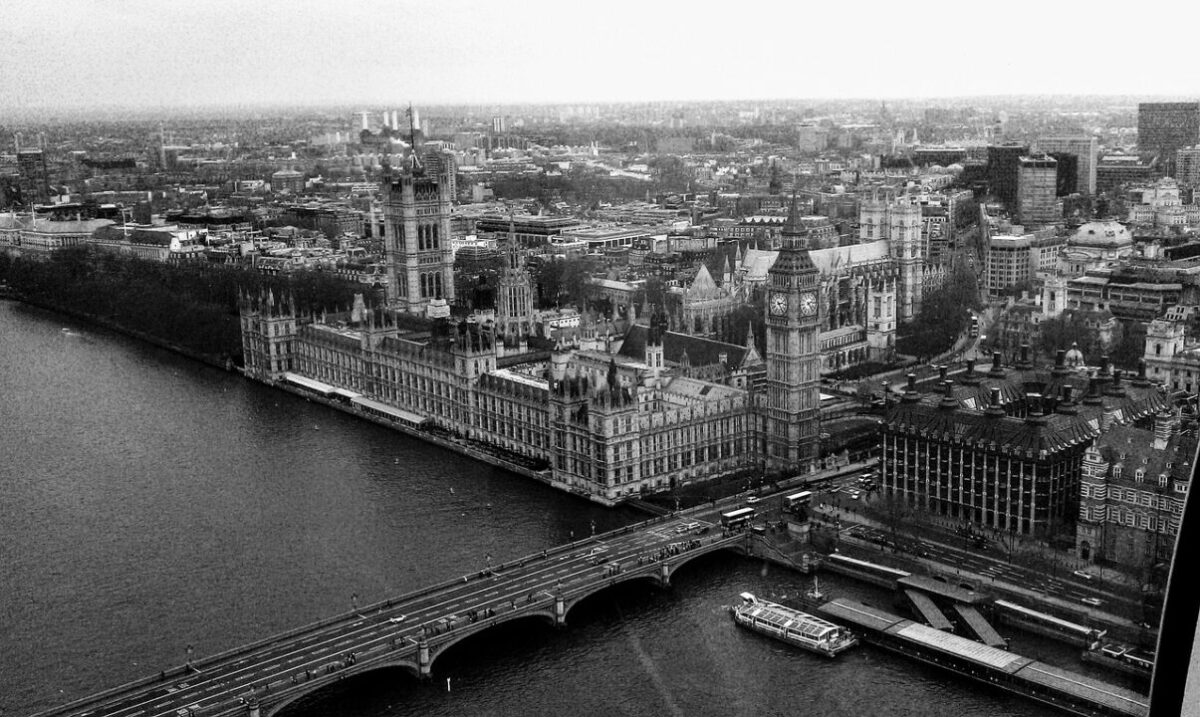
Eid-ul-Adha at the Fazl Mosque, 1939
On 31 January 1939, Eid-ul-Adha was celebrated at the Fazl Mosque in London. On this occasion, a reception was held at the Fazl Mosque which was attended by various dignitaries. The then Imam of the Fazl Mosque, Hazrat Maulana Jalal-ud-Din Shamsra expressed his concerns over the deteriorating situation in Palestine and called the British Government’s attention towards making efforts for peace in Palestine. He also praised the efforts of the British Prime Minister towards the peace of Europe. He mentioned a telegram from Hazrat Musleh-e-Maudra as well, which was sent to the British Prime Minister, appreciating his peace efforts amidst the conflict between major powers of Europe.
Reporting on this event, the South Western Star wrote:
“Muslim Festival
“A Meeting at Southfields Mosque
“Praise for Prime Minister
“The Imam of the London Mosque, Southfields, Maulvi J. D. Shams, praised the Prime Minister for preserving peace, and gave his views on the Palestine question, at a meeting at the mosque on Tuesday afternoon. Lieut.-Col. Sir Francis Younghusband, K.C.S.I., K.C.I.E., was in the chair. The occasion was the festival of ‘ld-ul-Azha, or ‘Festival of Sacrifices.’
“‘This occasion should not pass without tendering our gratitude to the Prime Minister, Mr. Chamberlain,’ said the Imam. ‘Since the last occasion of this festival, a grave crisis nearly brought Europe to the brink of the horrors of war. Mr. Chamberlain’s sincere efforts in preserving the peace, which is the aim of us all, deserve our heartiest thanks. The Head of the Ahmadiyya Community sent a telegram to the Prime Minister congratulating him on his courageous efforts for peace, and expressing the hope that he will make similar efforts for peace in Palestine and India.’
“An Alarming Thought
“‘To the Arabs of Palestine, the thought of being outnumbered and swamped by the Jews is very alarming. They will never tolerate it. Let the delegates who have come to London, and the Government, view the whole question in the true spirit of sincerity and impartiality. Let them evolve a solution, which, if not found now, will be difficult to achieve at a later date.’

“Among the large number of people present, including Muslims, Christians, Hindus, and men and women from many nations, were Sir Telford Waugh, Sir Findlater Stewart, Major-General J. H. Beith, Sir Arthur Wauchope (former High Commissioner for Palestine), Countess Carlisle, the Rev. S. Hopkinson, the Rev. Mr. Stevenson, Dr. and Miss Hatherby, and Capt. Ataullah, I.M.S. Members of the delegation from Saudi Arabia had accepted invitations to be present, but could not attend because arrangements were being made for the talks on Palestine.
“The Imam then explained to the guests the meaning of the festival of ld-ul-Azha. Abraham[as], he said, showed the world a supreme example of sacrifice and love for God when God commanded him to sacrifice his son, Ismail[as].
“The Morning Prayers
“To the Muslims, the most important part of the day was the morning, when prayers in the mosque were led by Maulvi Shams. Many congregated in the mosque, all with covered heads and without outdoor shoes. ‘Allah-o-Akbar’ (God is greatest) intoned the Imam. ‘Allah-o-Akbar’ the congregation responded in chorus.” (South Western Star, 3 February 1939, p. 5)
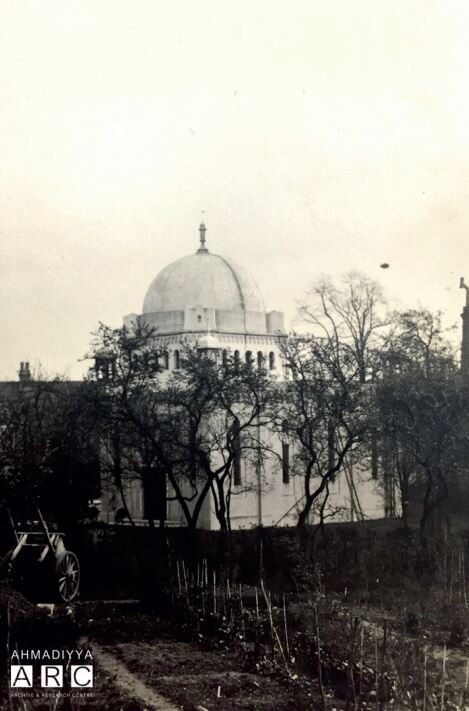
The appreciation of the British Prime Minister, Arthur Neville Chamberlain (1869-1940), by Hazrat Musleh-e-Maudra was due to his efforts to bring Britain and Germany to an agreement to avoid any war in the future. This agreement is commonly known as the Munich Agreement of 1938.
When this agreement took place, the Belfast News-Letter reported:
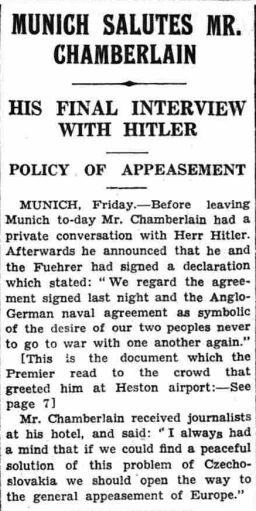
“Munich, Friday.—Before leaving Munich today Mr. Chamberlain had a private conversation with Herr Hitler. Afterwards, he announced that he and the Fuehrer had signed a declaration which stated: ‘We regard the agreement signed last night and the Anglo-German naval agreement as symbolic of the desire of our two peoples never to go to war with one another again.’
“[This is the document which the Premier read to the crowd that greeted him at Heston airport:—See page 7]
“Mr. Chamberlain received journalists at his hotel, and said: ‘I always had a mind that if we could find a peaceful solution of this problem of Czecho-Slovakia we should open the way to the general appeasement of Europe.’” (Belfast News-Letter, 1 October 1938, p. 9)
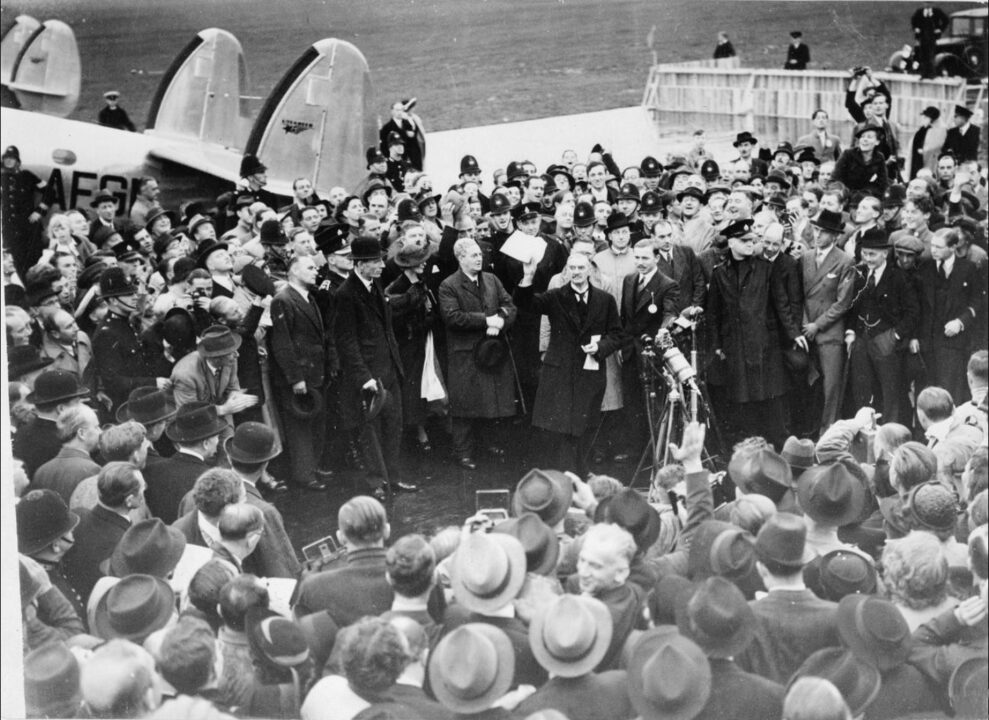
Opening of the Palestine Conference in London
On 7 February 1939, the Conference on the Palestine issue began in London. The Birmingham Mail reported under the heading “Palestine Talks”:
“Hitch Over Arab Representation
“Hope of Settlement
“Premier Welcomes the Delegates
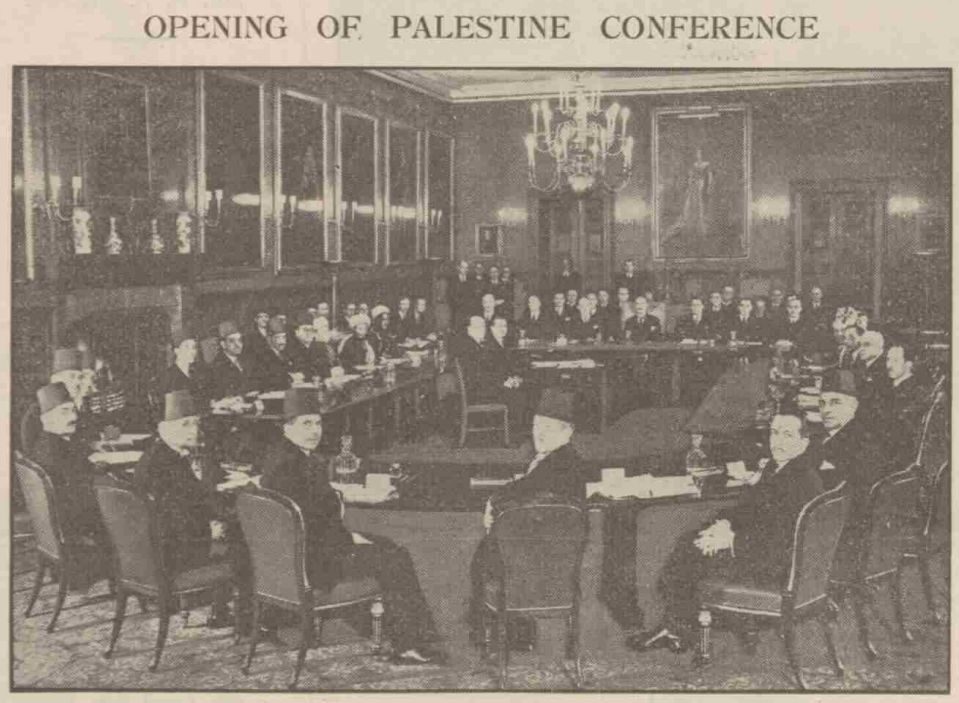
“The conference called by the British Government with a view to arriving at a settlement of the Palestine problem was opened at St. James’s Palace this morning by the Prime Minister.
“A hitch has occurred in connection with the talks. Differences have arisen between the Arab National Defence Party and the main Palestinian delegation, who are supporters of the Mufti and have the backing of the representatives of the neighbouring States. The whole of the Mufti Arabs declined to attend the opening ceremony if the Defence party members were present, and in consequence, the latter absented themselves.
“It is understood that a settlement may be arrived at in the near future.
“An official statement issued by the Government stated that efforts had been made to arrange with the different parties of Palestine Arabs for them all to be represented on one delegation.” (The Birmingham Mail, 7 February 1939, p. 6)

Reception at the Fazl Mosque
On 11 March 1939, Hazrat Maulana Jalal-ud-Din Shamsra invited the Viceroy of Mecca and representatives of Palestine, Iraq and Yemen — who were in London for the Palestine Conference — to a reception at the Fazl Mosque in which 200 guests participated in total, including various dignitaries.
Special message from Hazrat Musleh-e-Maudra
Hazrat Musleh-e-Maudra, Mirza Bashir-ud-Din Mahmud Ahmadra, sent a special message to the Arab delegates through a telegram. The message was read out in both English and Arabic by Hazrat Maulana Jalal-ud-Din Shamsra.
In his message, Huzoorra said:
“Welcome His Royal Highness the Amir Faisal and the Palestine Conference delegates, on my behalf, and tell them that the Community is completely with them, and prays that God may give them success and may help all Arab States on the path of prosperity and give them the leadership of the Muslim world—the leadership which they possessed in the early centuries of Islam.” (“The Ahmadiyya Khilafat’s call for Muslim unity: The solution to Israel-Palestine issue”, Al Hakam, 21 May 2021, Issue 166, pp. 21-23)
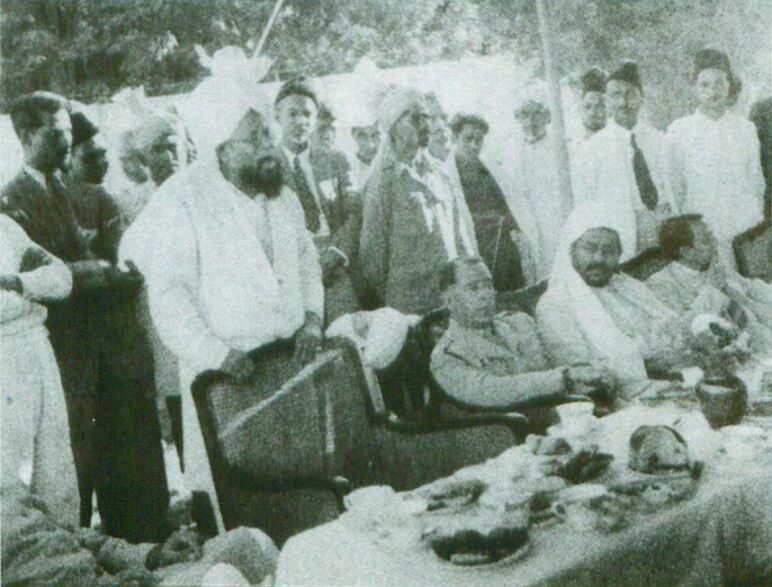
Proceedings of the reception
Many newspapers covered this event, such as the Sunday Express, South Western Star, Wimbledon Borough New, and Wandsworth Borough News.
The South Western Star published a lengthy article, along with a group photo, with the following caption:
“H.R.H. Prince Faisal (standing slightly in the foreground), with some of the Arab delegates and other friends. Just behind the Prince, on his right, stands the Saudi Arabian Minister (Sheikh Haji Hafiz Wahba). The Imam of the mosque (Maulana J. D. Shams) is second from the right, and, looking forward between him and the Prince is Sheikh Ibrahim Sullaiman (secretary of the Sawadia Arabia Legation). Photo: R. W. Smith, 162 Elsenham-street, Southfields.”
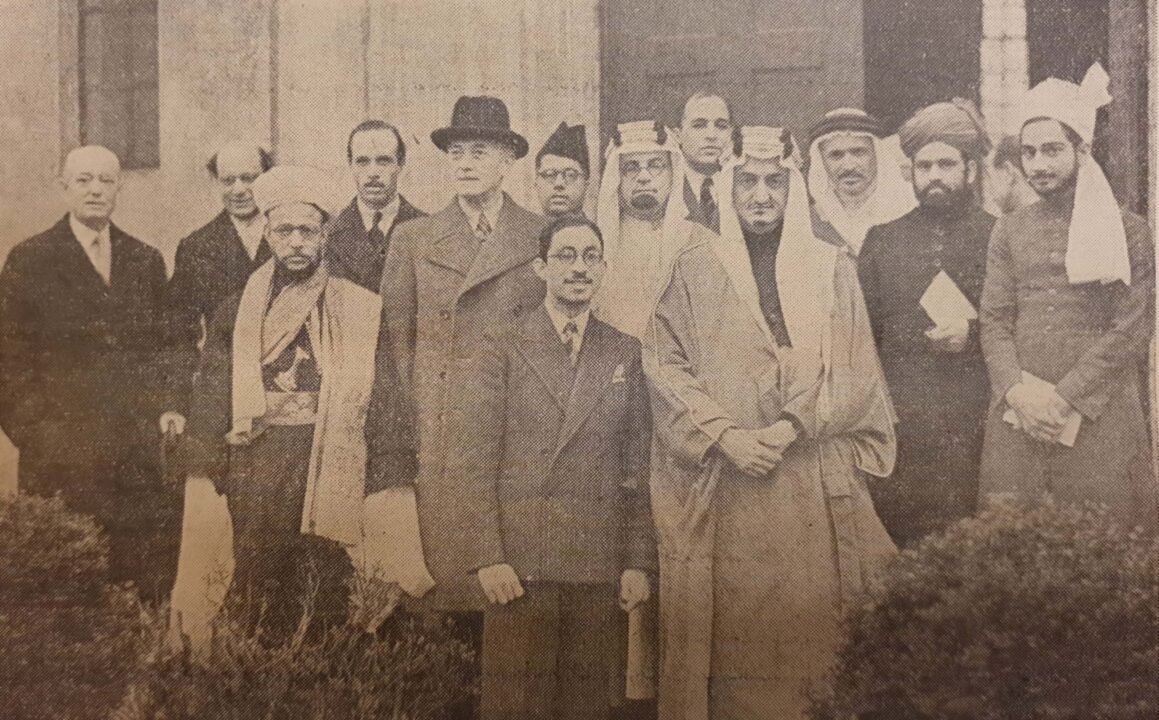
The article stated:
“Arabian Prince at Southfields Mosque
“Hopes for Peace in Palestine
“His Royal Highness the Amir Faisal, Viceroy of Mecca, and several of the Arabian delegates to the Palestine conference, one being his Excellency Taufiq-us-Sowadi, Foreign Minister of Iraq, were guests at the London Mosque, Southfields, on Saturday afternoon. The distinguished visitors were received in a large marquee in the grounds of the mosque, where a large number of other guests were gathered.
“Two English Muslims, Bilal Nuttal and Abdur Rahman Hardy, recited verses in Arabic from the Holy Quran.
“The Imam of the mosque, Maulana J. D Shams, H.A. speaking first in Arabic and then in English, read the following message cabled from the head of the Ahmadiyya Community in Qadian, India: ‘Welcome his Royal Highness the Amir Faisal and the Palestine Conference delegates, on my behalf, and tell them that the Community is completely with them, and prays that God may give them success and may help all Arab States on the path of prosperity and give them the leadership of the Muslim world—the leadership which they possessed in the early centuries of Islam.’
“Viceroy of Mecca
“Maulana Shams then referred to the great honour and esteem in which the leaders of the Arab countries were held throughout the Muslim world. His Royal Highness, he said, was the Viceroy of Mecca, the city which contained the Kaabah, and which was destined to be a place of pilgrimage to the end of time. A prophecy in the Holy Quran said that the Kaabah could never be conquered by people who did not believe in its sanctity. H.M. the King of Saudi Arabia had already introduced many reforms in his territory, including religious tolerance. His Excellency Taufiq-us-Sowad was well known to them for his statesmanship. He came from Baghdad, the city which for centuries kept burning aloft the torch of Islamic culture and civilisation. The Imam recalled the glories of the Abbasid Empire and the greatness of the Muslim divines of those days. He hoped that Iraq would regain the glory and the prestige history once gave to her. The Imam welcomed warmly the delegates from Yemen, the first country to accept Islam after the Hijaz.
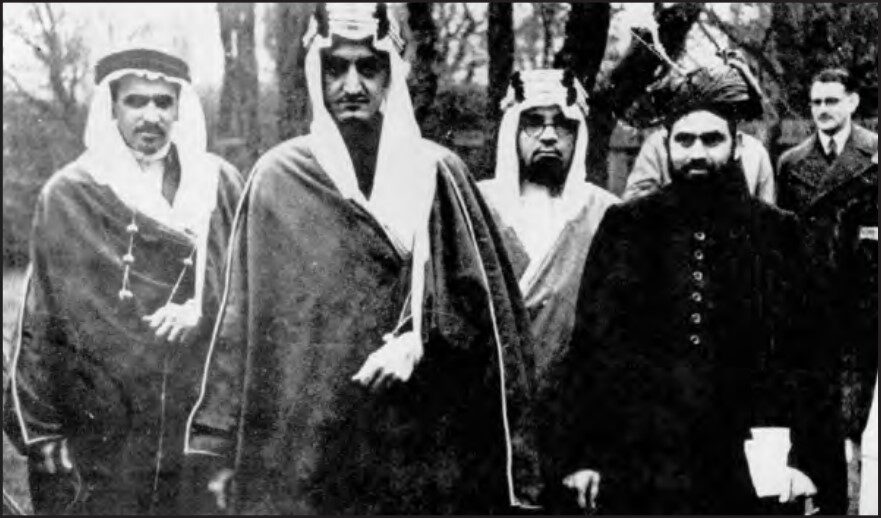
“The Future of Palestine
“Welcoming the delegates from Palestine, the Imam added, ‘It is for the future of Palestine that all our other distinguished guests have travelled to this country from their distant homes. I assure you that the Muslims of the entire world are whole-heartedly and solidly with you in the sincere desire for a solution of the Palestine problem, and by a solution I mean an issue which is completely satisfactory to you. Your demands are eminently just and proper, and we have no doubt that British statesmanship, in the interest of justice, humanity, and peace, will find ways and means to satisfy your demands, and will thus earn the lasting friendship of the entire Muslim world.’
“The Saudi Arabian minister (Sheikh Haji Hafiz Wahba), speaking in Arabic, thanked the Imam on behalf of his Royal Highness and the delegates.
“Like a Brick Wall
“His speech was translated into English by Ibrahim Moujy. He said the Muslims of the world were like a brick wall, of which every brick was important, and played its part in the support of the whole. The cooperation of all Muslims would help towards the achievement of a solution to the Palestine problem satisfactory to the people of Palestine and to the Muslim world. ‘We hope that the solution which is near at hand will be achieved in a way which will please us all,’ he concluded.
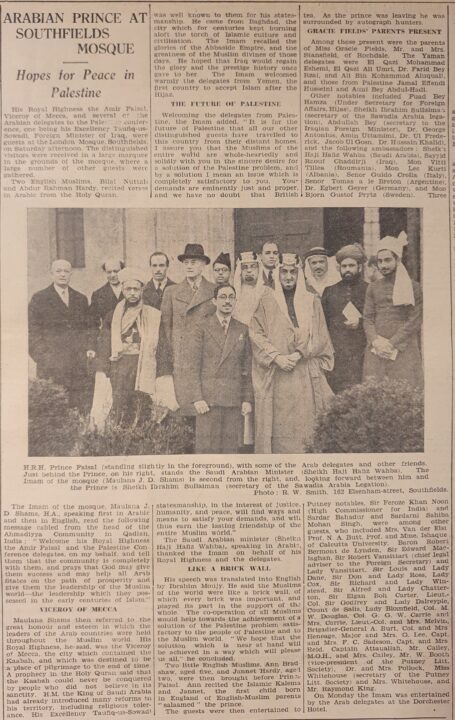
“Two little English Muslims, Ann Bradshaw, aged five, and Jannet Hardy, aged two, were then brought before Prince Faisal. Ann recited the Islamic Kalema and Jannet, the first child born in England of English-Muslim parents ‘salaamed’ the prince.
“The guests were then entertained to tea. As the prince was leaving he was surrounded by autograph hunters.
“Gracie Fields’ Parents Present
“Among those present were the parents of Miss Gracie Fields, Mr. and Mrs. Stansfield, of Rochdale. The Yemen delegates were El Qazi Mohammad Eshemi, El Qazi Ali Umri, Dr. Farid Bey Rzai, and Ali Bin Mohammad Aluquali, and those from Palestine Jamal Efendi Husseini and Auni Bey Abdul-Hadi.

“Other notables included Fuad Bey Hamza (Under Secretary for Foreign Affairs, Hijaz), Sheikh Ibrahim Sullaiman (secretary of the Sawadia Arabia legation), Abdullah Bey (secretary to the Iraqian Foreign Minister), Dr. George Antonius, Amin Uttamimi, Dr. Ul Frederick, Jacob Ul Gosn, Dr. Hussain Khalidi, and the following ambassadors: Sheikh Haji Hafiz Wahba (Saudi Arabia), Sayyid Raouf Chaddirji (Iraq), Mon Vitti Tillea [sic., Viorel Virgil Tilea] (Roumania), Mon Lec Kurti (Albania), Senor Guido Crolla (Italy), Senor Tomas a le Breton (Argentine), Dr. Egbert Geyer (Germany), and Mon Bjorn Gustof Prytz (Sweden). Three Putney notables, Sir Feroze Khan Noon (High Commissioner for India) and Sardar Bahadur and Sardarni Sahiba Mohan Singh, were among other guests, who included Mrs. Van der Kist, Prof. N. A. Butt, Prof. and Mme. Ishaque of Calcutta University, Baron Robert Bermont de Lynden, Sir Edward Maclaghan, Sir Robert Vansittart (chief legal adviser to the Foreign Secretary) and Lady Vansittart, Sir Louis and Lady Dane, Sir Don and Lady Ross, Lady Cox, Sir Richard and Lady Winstead, Sir Alfred and Lady Chatterton, Sir Elgan Boh Carter, Lieut.-Col. Sir Godfrey and Lady Dalrymple, Count de Salis, Lady Blomfield, Col. M. W. Douglas, Col. G. G. W. Carrie and Mrs. Carrie, Lieut.-Col. and Mrs. Melvin, Brigadier-General A. Burt, Col. and Mrs Heneage, Major and Mrs. G. Lee, Capt. and Mrs. F. C. Sadeson, Capt. and Mrs Reid, Captain Attauallah, Mr. Cailey, M.O.H., and Mrs. Cailey, Mr. W. Booth (vice-president of the Putney Litt. Society). Dr. and Mrs. Pollock, Miss Whitehouse (secretary of the Putney Litt. Society) and Mrs. Whitehouse, and Mr. Raymond King.
“On Monday the Imam was entertained by the Arab delegates at the Dorchester Hotel.” (South Western Star, 17 March 1939, p. 10)
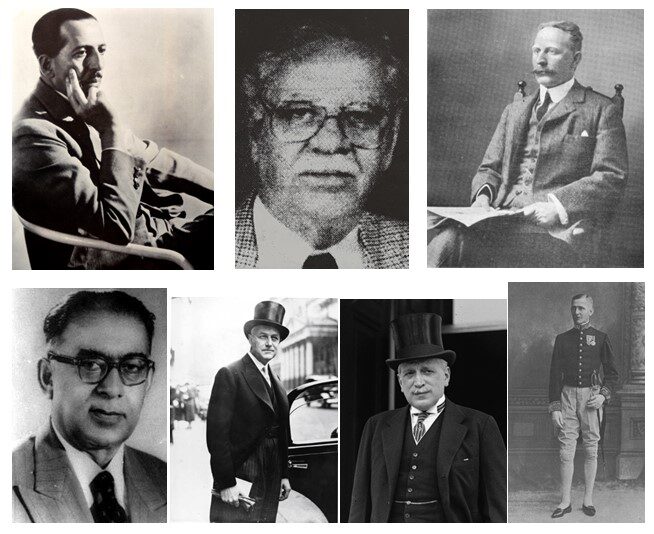
Palestine Conference fails
As far as the result of the Palestine Conference is concerned, it ultimately failed to bring out any peaceful and unanimous solution to the conflict. The Daily News Chronicle reported under the heading “Jews and Arabs reject Britain’s Final Plan”:
“The Palestine Conferences – the Government’s last effort to find an agreed settlement to the troubles of the Holy Land – are on the eve of breakdown.
“Both Jews and Arabs yesterday decided to reject the British proposals.
“The Jewish Conference Committee unanimously decided that the new plan offered no basis for agreement or further discussion, and many of the delegates are returning home.” (Daily News Chronicle, 17 March 1939, p. 1)



If the, then, Arabs sold Palestine, piece by piece for their selfish personal and financial gains, then when the differences and fights began unfolding, why is this an English problem ?
Now that the land is named and established as Israel, you are responsible to being the victims, self sponsored.
This is only unfortunate that you agreed to house them on your lands, in the first place ?
Palestine will surely be devoured, without any going back of these (so called) European Jews, anywhere, anytime soon, or even till ends of time.
You have lost peace for good, until these immigrants will devour the whole of middleastern regions.